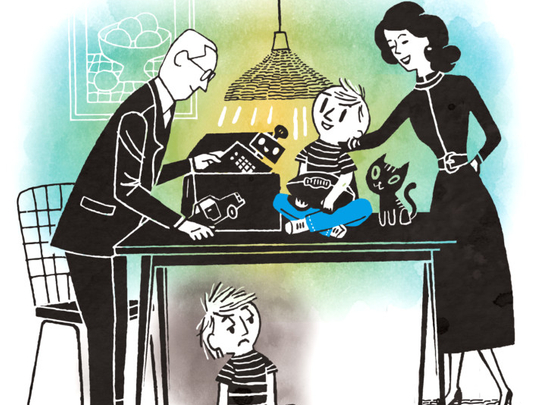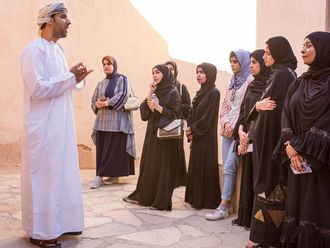
As parents, we don’t have favourite children. Or, at least, we shouldn’t. We love them all the same, but differently, meeting their needs as they arise.
As grandparents, we shouldn’t have favourites, either. But we do. It’s hard not to want to spend more time with the granddaughter who loves to read as much as you do. Or the grandson who loves to help you plant roses. There is a natural tendency to want to spend time with grandchildren who mirror our interests and personalities.
Before becoming a grandmother, I swore never to show favouritism. Years ago, I was the recipient of this behaviour. I didn’t always know what was happening, but it never felt good. My grandfather lived with us for 11 long years. During that time, he showered my sister with gifts, kind words and protection. She would start a fight, taunting and teasing me, and then sprint across the border to his room, leaving me crying and frustrated on the other side of an invisible wall.
It was a complex situation, actually, a Catch-22. Was he not loving me the same because I was not nice to him? Or was I mean to my grandfather because I could sense he didn’t like me very much? It took years of therapy for me to gain some much-needed self-confidence. And yet that question remains unanswered to this very day. I remember when he passed away. While my family grieved, I felt a twinge of relief. Then, of course, I felt guilty for not feeling sad. But by this time, I was a young adult and had moved on to my own life, carrying with me the promise to never favour one grandchild over the other.
I felt as if I had achieved this goal — until recently.
I watched my husband purchase an expensive laptop for our granddaughter recently and nothing for my grandson. Granted, she is older than her brother and needed one for school. But as soon as my husband took out his credit card, the pressure against my heart became unbearable and I had to walk out of the store to stop the world from spinning.
As much as I couldn’t stop my own grandfather, I had no control over my husband. We didn’t share the same past. From my stories, he knew how I had been treated, but he couldn’t feel my insides shattering as my grandfather hugged my sister, or merely tousled her hair as she passed by him in our hallway. The fact is, my sister felt bad about this special treatment, too. I know that now. She didn’t ask for it any more than I craved it. She recently told me she felt horrible when our grandfather returned from trips with extra presents for her.
Favouritism isn’t easy on anyone. Quite the opposite. Everyone in the family is affected in some way.
Family is a microcosm of the world, said Virginia Satir, the well-known family therapist. “To understand the world, we can study the family: Issues such as power, intimacy, autonomy, trust and communication skills are vital parts underlying how we live in the world. To change the world is to change the family.”
Altering behaviour
A family lives, works and breathes as a unit. If one person is sick, the family routine is altered. When one person is absent, such as a child at camp or parent on a business trip, life runs differently.
Thus, it logically follows that favouritism weaves itself into the dynamics and alters everyone’s behaviour.
In our case, my mother compensated for my grandfather’s actions by spending more time with me. My sister, even at her young age, understood why my mum would often take me shopping and leave her at home. And there was my father, who tried to keep a balance.
When my husband gave our granddaughter her gift, tears filled his eyes. Upon seeing her present, our granddaughter began crying. At that moment, I caught my grandson’s eye. He was crying, too.
I was 16 again, watching my grandfather hand my younger sister the keys to her very own car. And that question, the one that lurks in the back of my mind, resurfaced. What about me?
So, when no one was looking, I took that lovable, young boy aside and promised him a laptop of his own in two years. And I kept that promise.
And I’ve since been very aware of my actions. Here’s what I’ve learned to do:
n I think before I speak. It’s a simple adage we teach our children from an early age, but one we need to think about just as much as we grow older. I check myself to make sure I’m giving equal praise with the same enthusiasm. What we say is just as important as how we say it. If I rave about the granddaughter’s fantastic new haircut, but then look at her brother and say, “Oh, and you look great, too,” that second compliment definitely comes off as an afterthought.
n I never come with gifts for one grandchild, unless it is a special event, such as a birthday or graduation.
n I chauffeur equally. Now that my grandchildren are older, I’ve become “The Carpool Granny”. When their parents are busy, they turn to me for rides. If I take my granddaughter to dance, but don’t have time to take my grandson to track, he notices.
n I spend equal time on hard benches. If sporting events fall on the same day, I trade off. One Saturday with my grandson. The next with my granddaughter.
But it takes constant awareness on my part. I still find myself wanting to say “yes” to my sweet, funny granddaughter, no matter what she asks, and no to the rambunctious grandson who moves too quickly from place to place. Whose energy is exhausting, but is exactly as it should be. Because that is who he is. And so I stop myself, because he will know when he’s not getting the attention he deserves. And his sister will know she’s getting more.
I was that grandchild, and I promise not to let it happen again.
— Washington Post
Janie Emaus is a senior writer and blogger.









